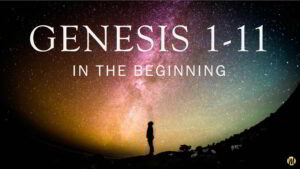 Genesis 1–11: God’s Design for Nationhood (Pt. 4/5)
Genesis 1–11: God’s Design for Nationhood (Pt. 4/5)
Category: Old Testament Theology & Criticism
Genesis 1–11: God’s Design for Civilization (Pt. 3/5)
 Genesis 1–11: God’s Design for Civilization (Pt. 3/5) Creation Mandate
Genesis 1–11: God’s Design for Civilization (Pt. 3/5) Creation Mandate
God’s purpose for humanity is expressed in the Creation Mandate. Understood in context, it is to turn the rest of the earth outside Eden into Eden. It involves building a global civilization that is in fellowship with God and consistent with his will. After sin came into the world and humanity was driven out of Eden, the mandate could no longer be fulfilled as intended. The mandate was derailed but not defeated because God cannot be defeated. Through Christ the Creation Mandate is reclaimed so that it will be fulfilled as intended. This is seen in the Great Commission, which is about making disciples of all nations so that they observe everything Christ has commanded in every aspect of their life (a global civilization consistent with God’s will); and Christ is with disciples of all nations through the Spirit (a global civilization in fellowship with God). It is crucial to recognize that the Great Commission is the renewed Creation Mandate. For it means disciples of Christ cannot dichotomize the spiritual from the secular in any aspect of their life—a problem that has been plaguing modern Christianity.
You can view the full video at
Genesis 1–11: God’s Design for Civilisation (Pt. 3/5) Creation Mandate
Genesis 1–11: God’s Design for Humanity. Pt. 1/5
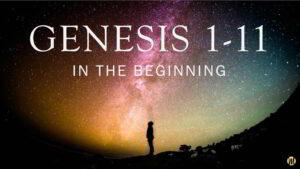 Genesis 1–11: God’s Design for Humanity. Pt. 1/5
Genesis 1–11: God’s Design for Humanity. Pt. 1/5
Resurrection of Christ as Fulfilment of God’s Covenant Promise of Salvation. BADR Part 5
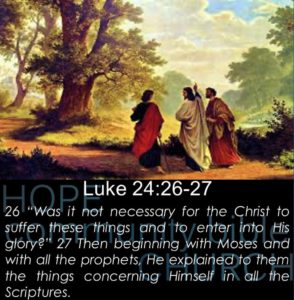
Resurrection of Christ as Fulfilment of OT Prophecy of Salvation. BADR 5
Kairos Podcast Series 8: Biblical Anthropology, Death and Resurrection (BADR Part 5)
Question: How is the hope of Israel that believers will be resurrected and enjoy the eternal presence of God related to the resurrection of Christ?
God’s covenant was the promise and fulfillment of Israel’s hope of resurrection:
1) God’s promise of covenantal inheritance in his covenant with Abraham and his descendants. “And I will establish my covenant between me and you and your offspring after you throughout their generations for an everlasting covenant, to be God to you and to your offspring after you” (Gen. 17:7).
2) The qualifier “everlasting covenant to be God to you and to your offspring” points to the eternal salvation of the person who believed in God. “God is everlasting, the promised inheritance under the covenant consists of reconciliation to this eternal God, and it is therefore only to be expected that God’s elect should continue to exist in fellowship with Him.” (Barton Payne)
3) The resurrection of Christ is fulfilment of God’s covenant promise of salvation. The everlasting covenant promise and eschatological hope of Israel is the necessary framework to understand Christ’s resurrection. Conversely, Christ’s resurrection proleptically realized the eschatological promise of the covenant.
Acts 2: 23-24 The keynote in Peter’s first sermon on the day of Pentecost: “this Jesus, delivered up according to the definite plan and foreknowledge of God, you crucified and killed by the hands of lawless men. God raised him up, loosing the pangs of death, because it was not possible for him to be held by it.” // Psa. 16:8-11
Acts 2: 27 – “For you will not abandon my soul to Hades, or let your Holy One see corruption. Peter saw this fulfilled literally in Jesus’ resurrection from the grave after only three days. He died as the Scriptures revealed He would (according to the Scriptures)”.
You can view the video at –
Resurrection of Christ as Fulfilment of OT Prophecy of Salvation. BADR 5
Old Testament Anthropology as “Dualistic Holism” or “Holistic Dualism”. (BADR Part 2)
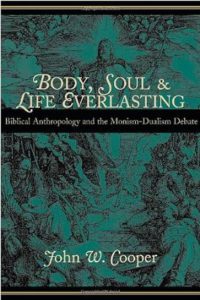
𝐊𝐚𝐢𝐫𝐨𝐬 𝐏𝐨𝐝𝐜𝐚𝐬𝐭 𝐒𝐞𝐫𝐢𝐞𝐬 𝟖: 𝐁𝐢𝐛𝐥𝐢𝐜𝐚𝐥 𝐀𝐧𝐭𝐡𝐫𝐨𝐩𝐨𝐥𝐨𝐠𝐲, 𝐃𝐞𝐚𝐭𝐡 𝐚𝐧𝐝 𝐑𝐞𝐬𝐮𝐫𝐫𝐞𝐜𝐭𝐢𝐨𝐧 (𝐁𝐀𝐃𝐑 𝐏𝐚𝐫𝐭 𝟐)
𝐐𝐮𝐞𝐬𝐭𝐢𝐨𝐧: 𝐘𝐨𝐮 𝐝𝐞𝐟𝐞𝐧𝐝𝐞𝐝 𝐛𝐢𝐛𝐥𝐢𝐜𝐚𝐥 𝐝𝐮𝐚𝐥𝐢𝐬𝐦, 𝐚𝐧𝐝 𝐭𝐡𝐞𝐧 𝐲𝐨𝐮 𝐞𝐱𝐩𝐥𝐚𝐢𝐧𝐞𝐝 𝐭𝐡𝐚𝐭 𝐭𝐡𝐢𝐬 𝐯𝐢𝐞𝐰 𝐢𝐬 𝐡𝐨𝐥𝐢𝐬𝐭𝐢𝐜. 𝐇𝐨𝐰 𝐜𝐚𝐧 𝐭𝐡𝐞𝐬𝐞 𝐭𝐰𝐨 𝐯𝐢𝐞𝐰𝐬 𝐛𝐞 𝐜𝐨𝐧𝐬𝐢𝐬𝐭𝐞𝐧𝐭? \
While the Bible affirms anthropological dualism, it also views human beings holistically where all their psychosomatic faculties work together as an integrated unity. However, biblical holism differs from philosophical holism or physicalism which considers the organism or anthropological entity as comprising a single substance or stuff. In contrast, biblical “functional holism” recognizes the integration and interrelation of all the parts in the existence and proper operation of the whole, without assuming that each part would necessarily cease to function or disintegrate into nothingness if the whole were broken up. To conclude, OT anthropology is both dualistic and holistic. It may be described as either biblical “holistic-dualism” or “dualistic holism”.
Old Testament Anthropology as “Dualistic Holism” or “Holistic Dualism”
OT Anthropology: The Constituent Elements of Man. (BADR Part 1)
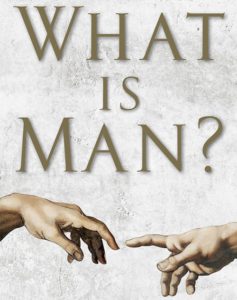
OT Anthropology: The Constituent Elements of Man. (BADR Part 1)
Kairos Podcast Series 8: Biblical Anthropology, Death and Resurrection (BADR Part 1).
A. Contemporary Criticism Against Biblical Dualistic Anthropology
Under the influence of prominent liberal scholars like Adolf Harnack in the early 20th century, the movement to decouple biblical theology from the alleged influence of Greek or Platonic philosophical influences gained momentum…
The distinctive usage of biblical anthropological terms should alert us to the need to examine Scripture on its own terms in order to resolve the controversy between holism and dualism. This post shall examine closely how the terms which describe the constituent elements of man are used in the OT…
B. Man’s Constituent Elements
Bāsār, Flesh
Note that flesh does not connote the principle of sin or the man’s unregenerate nature. It connotes a nature which is frail and transient: “all flesh is grass” (Isa. 40:6; Psa. 78:39). However, “flesh” is open to God’s positive influence so that a heart of stone could be changed into a heart of flesh, something which is soft and yielded to God (Ezek. 36:26).” Continue reading “OT Anthropology: The Constituent Elements of Man. (BADR Part 1)”
The Uncanny Superiority of Ecclesiastes over Its Counterparts (Ecclesiastes 5/5)
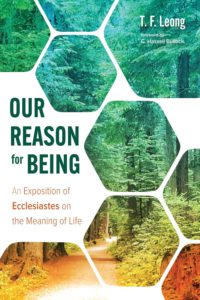 The Uncanny Superiority of Ecclesiastes over Its Counterparts
The Uncanny Superiority of Ecclesiastes over Its Counterparts
Kairos Podcast 7: Ecclesiastes and the Human Quest for Meaning (5/5)
Ecclesiastes is a speech “framed” by third-person references to the speaker, including a description of him and his teaching. In this description it is explicitly claimed that the speech is Scripture inspired by God. However, recent commentaries by even Evangelical scholars assume pessimism and contradictions in the speech. How then can it be Scripture inspired by God? The first video indicated that the supposed pessimism and contradictions in the speech are only apparent, not real. This final video seeks to corroborate the explicit claim that the speech is Scripture inspired by God by showing that the wisdom of Ecclesiastes is uncannily superior to that of its non-biblical counterparts.
Perceiving Coherence in Life Despite Undeserved Suffering (Ecclesiastes 4/5)
 Perceiving Coherence in Life Despite Undeserved Suffering
Perceiving Coherence in Life Despite Undeserved Suffering
Kairos Podcast 7: Ecclesiastes and the Human Quest for Meaning (4/5)
Discovering the Most Worthwhile Purpose for Living ( Ecclesiastes 3/5)
 Discovering the Most Worthwhile Purpose for Living ( Ecclesiastes 3/5)
Discovering the Most Worthwhile Purpose for Living ( Ecclesiastes 3/5)
Kairos Podcast 7: Ecclesiastes and the Human Quest for Meaning (3/5)
There are two conditions for experiencing the meaning of life. This video discusses the first, revealed in Ecclesiastes as living out God’s purpose for humanity. This condition is corroborated empirically by real-life human experience in a recent PhD thesis. One need not be a Christian to discover and live out this purpose and experience the meaning of life. However, Ecclesiastes also reveals that God will one day judge every person based on this purpose. Because of sin, no one can live out this purpose perfectly and so everyone needs God’s forgiveness. Hence Ecclesiastes points non-Christians to Christ no matter how meaningful their life may be.
Biblical Dualism and the Soul Between Death and Resurrection (the Intermediate State)
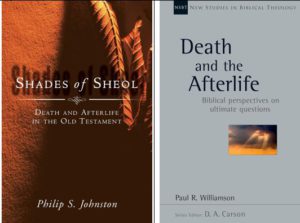 Death, Resurrection and Life Everlasting DRLE Pt.2
Death, Resurrection and Life Everlasting DRLE Pt.2
Death involves disintegration of a person’s vital power, cessation of bodily life, and separation of the body and the soul (nepeš): Gen. 35:18; 1 Kings 19:4). Does the soul continue to exist after the death of the person? The monist theologian’s answer is “no”. Monism argues that according to the Bible, a human being is not divided into separate parts, i.e. body, soul, and spirit, but he exists as a unified or holistic self. Since the soul and the body are just different aspects of a person, existence entails bodily existence. There is no possibility of disembodied existence of the soul after death. The purpose of this post is to show that monism contradicts the Bible which ascribes to the disembodied soul some forms of consciousness in the intermediate state between death and final resurrection.1This post focuses on the biblical teaching on the soul’s disembodied existence in the intermediate state. For a philosophical defence of the tenability of disembodied existence of the soul, see Paul Helm, “A Theory of Disembodied Survival and Re-embodied Existence,” Religious Studies (1978), pp. 15-26; Richard Purtill, “Disembodied Survival,” Sophia 12 (1973), pp. 1-10. Continue reading “Biblical Dualism and the Soul Between Death and Resurrection (the Intermediate State)”